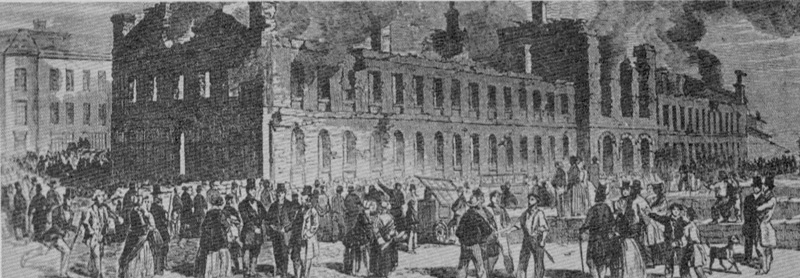
HISTORICAL EVENTS THAT TOOK PLACE ON THIS DAY IN CANADA
25 April

The Smouldering Ruins of the Quebec Parliament
Rebellion Losses Bill Signed, Rioting Ensues
On April 25, 1849, Lord Elgin signed the Rebellion Losses Bill. Thomas Raddall wrote in The Path of Destiny: "It was a memorable date in Canadian history, for he signed the bill and in that one firm signature made clear that from now on Canada (and British governors-general) were to be ruled by Canadians though the heavens fell."
The Rebellion Losses Bill provided payment for people who had suffered property damage during the rebellions of 1837-1838. The English-speaking people in Quebec went wild with anger. How could the Queen's own representative in Canada sign a bill rewarding treason? The answer was that the bill had been passed by Parliament and therefore, under the principle of responsible government, the Queen's representative had to sign it, whether he agreed with it or not.
Lord Elgin was booed in Parliament and pelted with rotten eggs when he left. The Gazette called him "the last governor of Canada" and urged Tory sympathizers to attend a mass meeting in the Place d'Armes. Rioting then got completely out of control. People stormed from the meeting and rushed into Parliament which was in session. Someone yelled that the "French Parliament" was dissolved and stole the mace. In a few minutes the interior of the building was a shambles, with furniture, doors and windows smashed and pictures torn from the wall.
The end of the Parliament building came when the gas jets were torn from the wall and caught fire. The mob would not allow the fire department to try to stop the flames and the building was burned to ashes.
Rioting went on for days. Lord Elgin was nearly killed when his carriage was wrecked by heavy stones. He could have called out troops to quell the rioting, but they were under British control. This would have meant that the Imperial Government was interfering in a Canadian civil matter.
Eventually, more responsible elements of the English-speaking population established order by enlisting a force of special constables. Even so, riots broke out periodically for a year. There was even a movement on the part of leading Tories to have Canada join the United States (see July 26).
OTHER NOTABLE EVENTS ON THIS DAY IN CANADIAN HISTORY
25 April
-1720 A governor and council of Nova Scotia were appointed.
-1858 The first gold miners heading for Fraser River arrived at Victoria, British Columbia.
-1862 John A. Macdonald's motion for a more efficient militia led to the defeat of the government on May 20.